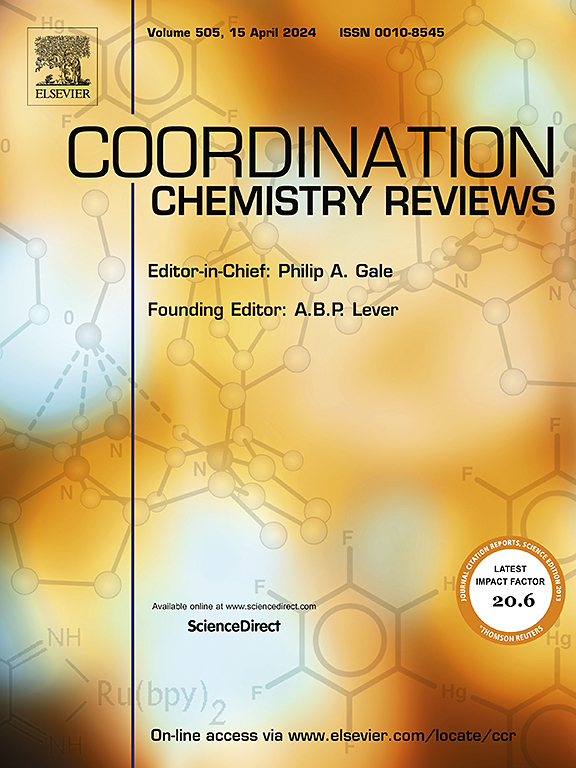Recent advances of Schiff base metal complexes as potential anticancer agents
IF 20.3
1区 化学
Q1 CHEMISTRY, INORGANIC & NUCLEAR
引用次数: 0
Abstract
The successful clinical application of Pt-based drugs in anticancer therapy has stimulated interest in the development of metallodrugs. Numerous metal complexes with significant anticancer activity and fewer side effects have been reported. However, lack of stability is one of the problems restricting the development of metallodrugs. Schiff bases attract a lot of interest because of their excellent properties. They can stabilize various oxidation states of metals and be synthesized easily. Therefore, Schiff bases are known as “privileged ligands” for transition metals. Schiff base metal complexes have a wide range of activities, among which anticancer activity is remarkable and has a large potential for development. In this review, various Schiff base metal complexes with anticancer activities from 2015 to the present are summarized. Their structures, biological activities, targets, and mechanisms of action are discussed in depth. These complexes display a diverse array of structures and have been shown to possess significant anticancer activity. Notably, Schiff base metal complexes demonstrated anticancer activity through various mechanisms, including deoxyribonucleic acid (DNA) damage, reactive oxygen species (ROS) generation, mitochondrial pathway, endoplasmic reticulum stress (ERS), inhibition of epidermal growth factor receptor (EGFR), activation of immunogenic cell death (ICD), and the induction of apoptosis. This review may provide guidance to the development and mechanistic investigations of future anticancer metallodrugs.
希夫碱金属配合物作为潜在抗癌剂的最新进展
铂类药物在抗癌治疗中的成功临床应用激发了人们对金属药物开发的兴趣。据报道,许多金属复合物具有显著的抗癌活性和较少的副作用。然而,缺乏稳定性是制约金属药物开发的问题之一。希夫碱因其优异的特性而备受关注。它们可以稳定金属的各种氧化态,而且易于合成。因此,希夫碱被称为过渡金属的 "特权配体"。希夫碱金属配合物具有广泛的活性,其中抗癌活性显著,具有很大的开发潜力。本综述总结了 2015 年至今各种具有抗癌活性的希夫碱金属配合物。深入讨论了它们的结构、生物活性、靶点和作用机制。这些配合物显示出多种多样的结构,并被证明具有显著的抗癌活性。值得注意的是,希夫碱金属复合物通过各种机制表现出抗癌活性,包括脱氧核糖核酸(DNA)损伤、活性氧(ROS)生成、线粒体途径、内质网应激(ERS)、抑制表皮生长因子受体(EGFR)、激活免疫性细胞死亡(ICD)和诱导细胞凋亡。本综述可为未来抗癌金属药物的开发和机理研究提供指导。
本文章由计算机程序翻译,如有差异,请以英文原文为准。
求助全文
约1分钟内获得全文
求助全文
来源期刊

Coordination Chemistry Reviews
化学-无机化学与核化学
CiteScore
34.30
自引率
5.30%
发文量
457
审稿时长
54 days
期刊介绍:
Coordination Chemistry Reviews offers rapid publication of review articles on current and significant topics in coordination chemistry, encompassing organometallic, supramolecular, theoretical, and bioinorganic chemistry. It also covers catalysis, materials chemistry, and metal-organic frameworks from a coordination chemistry perspective. Reviews summarize recent developments or discuss specific techniques, welcoming contributions from both established and emerging researchers.
The journal releases special issues on timely subjects, including those featuring contributions from specific regions or conferences. Occasional full-length book articles are also featured. Additionally, special volumes cover annual reviews of main group chemistry, transition metal group chemistry, and organometallic chemistry. These comprehensive reviews are vital resources for those engaged in coordination chemistry, further establishing Coordination Chemistry Reviews as a hub for insightful surveys in inorganic and physical inorganic chemistry.
 求助内容:
求助内容: 应助结果提醒方式:
应助结果提醒方式:


